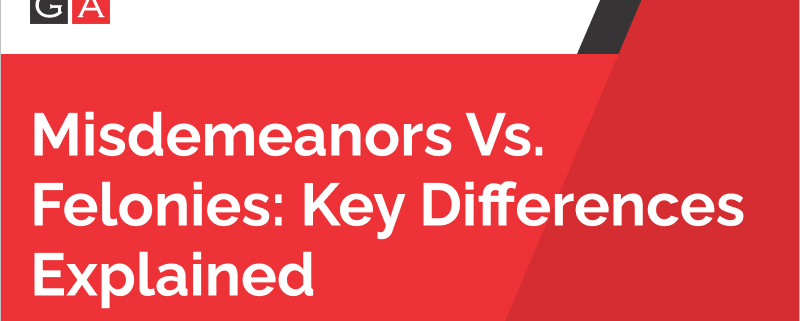Misdemeanors vs. Felonies: Key Differences Explained
Not all criminal charges are created (or treated) equally. One crime could be the difference between a slap on the wrist and a lifetime in prison. Misdemeanors and felonies are two categories of criminal offenses, each with drastically different consequences.
From minor infractions to serious crimes, the line between felonies and misdemeanors isn’t always clear-cut. There are various penalties for each kind of crime, and sometimes, a misdemeanor is elevated to a felony because 1) a repeat offender committed the crime or 2) the crime was severe enough to warrant a felonious conviction.
Knowing the difference between misdemeanors and felonies will help you understand the legal system, especially if you’re accused of committing a crime.
Defining Misdemeanors and Felonies
At its core, criminal law separates misdemeanors and felonies based on the severity of an offense and its consequences.
For example, a misdemeanor is a less serious crime often punishable by less than 12 months in jail or legal fees, such as court fines and restitution to victims. Common misdemeanors may include petty theft, simple assault, and public intoxication.
In contrast, felonies are more serious crimes, usually punishable by lengthy jail time and, in some cases, a life-or-death sentence. Felonies may include robberies, large-scale drug trafficking rings, and homicide.
The key difference? Felonies carry more severe penalties and long-lasting impacts.
Penalties: Comparing Jail Time, Fines, and Probation
Penalties for misdemeanors and felonies vary. Misdemeanors generally carry lighter, shorter sentences, typically under a year in county jail, along with fines or probation. For instance, a misdemeanor DUI charge may result in 60 days in jail, but most offenders get probation with mandatory alcohol education classes.
Felonies, however, come with harsher consequences for more severe actions. A felony conviction usually leads to more than a year in prison, with hefty fines and a permanent criminal record. Even after serving time, felons may face ongoing consequences, such as losing the right to vote or own firearms.
In Nevada, depending on the severity of a felony, sentences could range from a few years in prison to a life sentence or even the death penalty.
How Charges are Determined and the Role of Wobblers
Some crimes walk the line of misdemeanors and felonies, and they are known as “wobblers.” They could be charged either way, depending on the severity of the crime. For example, theft could be a misdemeanor if the stolen property is low value. However, if the value is higher (in the thousands) or if there are aggravating circumstances (like armed assault), it could be charged as a felony.
The Long-Term Impact of a Misdemeanor vs. Felony Conviction
Beyond immediate penalties, the long-term effects of a conviction can be life-altering. Misdemeanors may stay on your record but are less likely to impact your ability to get a job or an apartment or apply for some loans. On the other hand, felonies are more challenging to move past. A felony conviction can follow you forever, making it harder to find employment, housing, or even qualify for government assistance.
Contact Cega Law Group to learn more about criminal law and why it matters.
 Call Now:
Call Now: info@cegalawgroup.com
info@cegalawgroup.com










